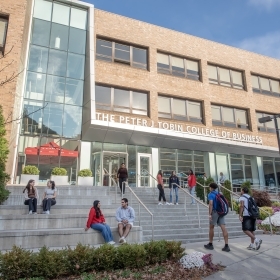How to Write a Personal Essay that Moves Admissions

Learn how to write a compelling personal essay with guidance from St. John’s University, Queens, NY. Discover tips, examples, and ideas to make your college application stand out.
You’ve spent years preparing for this moment: applying to college. While grades, test scores, and extracurriculars all play a role, there’s one piece of your application that truly gives you a chance to shine—a personal essay. This isn’t just another formality—it’s your opportunity to stand out in a sea of applicants (1,425,083 applicants to be exact). It’s your opportunity to reveal what makes you tick, what shapes your decisions, and why you’re the perfect fit for the school of your dreams.
Writing a college application essay can feel daunting, but it’s also your moment to tell your story. A strong essay won’t just list your achievements; it will capture your personality, your growth, and your vision for the future. Whether you’re navigating Common App essay prompts or trying to figure out how to write a college essay that resonates with admissions officers, it all starts with one thing: your story. Here are some college essay tips to help you craft an essay that not only gets noticed, but remembered.
6 Ways to Make Your Personal Essay Stand Out
1. Reflect on What Makes You, You.
The best college essays start with meaningful self-reflection. Before you write, take the time to think deeply about the experiences that have shaped you, both inside and outside of the classroom. These are the moments that tell your story and give you insight into what makes you unique. Consider questions like:
- What life experiences or challenges have shaped my character?
- What excites me and ignites my passion?
- How do I approach setbacks, and what lessons have I learned from them?
Choosing a topic that holds personal significance is key. While browsing college application essay examples can offer inspiration, your story should genuinely reflect who you are. Even if your story seems "ordinary," it can still be powerful when presented with authenticity and heart. For example, a student may write about a family tradition that taught them about resilience or a seemingly small moment—like learning to ride a bike—that instilled independence. What matters is not the event itself, but how it shaped you.
2. Don’t Just Pick a Topic, Pick a Conversation.
Admissions officers sift through thousands of college essays, so choosing a story that captures your unique perspective is crucial. Use Common App essay prompts as a starting point, but look deeper into your experiences for a narrative that truly defines you. Go beyond listing achievements; explore what drives and defines them. The most compelling stories often stem from personal challenges or experiences that ignited transformation. If you’re not sure where to start, you could try doing a simple personal details brainstorm or doing a personal values exercise.
For example, rather than focusing solely on winning a sports championship, consider how the journey led to personal growth. Perhaps your biggest takeaway was learning how to be a supportive teammate or how to handle loss with grace. Similarly, instead of simply recounting how you helped organize a school event, explore how that experience taught you leadership, communication skills, or how to adapt under pressure.
One of the most memorable personal essay topics could be a setback or failure that helped you understand what it truly means to succeed. If you faced a personal or academic challenge, explore how it forced you to rethink your priorities, discover new strengths, or develop resilience. These types of essays give admissions officers a deeper look into your character and perseverance.
3. Write With Authenticity. Write Something Real.
Admissions officers are looking for students who are genuine and true to themselves. This means that your college application essay should sound like you. Write as if you’re talking to a trusted friend or mentor, and avoid trying to impress with overly complicated words or grandiose statements. Authenticity is crucial—it’s what allows your personality to shine through.
To illustrate this point, let’s examine how one college essay topic can lead to two very different approaches in writing.
Prompt: “Describe a personal challenge or goal you set for yourself and how it impacted your growth.”
Response #1: A Journey of Resilience and Growth
When I decided to run a 5k every quarter, I had no idea how much it would push me. The first race was tough—my legs ached, my breath came in quick bursts, and my heart pounded in my chest. But I kept going. With each race, the pain became a little easier to handle, and I started to notice my body getting stronger.
As the races went on, I began to feel more energy while running. My steps became smoother, my breathing steadier, and the excitement of beating my time drove me to keep going. Outside of the races, I felt the difference, too. I woke up with more energy, slept better at night, and no longer felt worn out by the day. By the fourth 5k, I had cut minutes off my time, and it wasn’t just about finishing the race—it was about the hard work I had put in and the confidence I had built. It wasn’t just running anymore; it was about challenging myself, sticking to my goals, and enjoying the growth along the way.
Response #2: Discipline and Transformation
What initially seemed like a simple goal—completing a 5k each quarter—quickly morphed into a rigorous exercise in discipline and incremental self-betterment. Early races were fraught with physical limitations, yet each event underscored a gradual, almost imperceptible, enhancement in both my endurance and race times. This progression transcended mere physical improvement, catalyzing broader gains in energy, mental acuity, and overall well-being.
As the challenge persisted, my stamina solidified, sleep deepened, and stress management improved. By the fourth race, I had not only surpassed my time expectations but had also internalized the paramount value of perseverance and goal-oriented discipline. This experience reinforced the inextricable link between sustained effort and personal growth, propelling me to continue advancing beyond self-imposed limits.
Which Version Stands Out—and Why?
Which version better represents a real person and their struggles? While both versions describe the same accomplishment, it’s clear the first one feels more authentic and personal, like it’s coming from you, the applicant.
When writing your personal essay, let your voice come through naturally and relatably. You don’t need to sound like you pulled out a thesaurus or tried to get the highest word score on Scrabble. Admissions officers want to get to know you—not an overly polished or contrived version of yourself.
4. Write a Story, Not a Résumé.
To keep readers engaged, your college application essay should have a clear structure. While this may sound like basic "Writing 101," it’s easy to overlook, or fall into avoidable mistakes, when you’re deep into the writing process. A well-organized essay guides the admissions officer through your story, allowing them to fully understand your growth and your journey.
Here are the essential components of a well-structured college essay:
Introduction
Start with an attention-grabbing hook. This could be an intriguing fact, a thought-provoking question, or a vivid description of a moment that encapsulates your story. For example, you might begin by describing a turning point—a moment that changed everything for you, like watching your first documentary about climate change or receiving an unexpected act of kindness during a tough time.
Body
Develop your narrative by providing context, challenges, and key turning points. Don’t just list events—show what they meant to you. Share how you grew, what you learned, and how it shifted your perspective on the world or your goals. This is where your essay’s depth and insight shine. Consider how you can expand on your experiences with details that highlight your growth, resilience, and personal transformation.
Conclusion
Wrap things up with a reflective conclusion that ties everything together. Show how this experience has shaped your current goals and vision for the future. Admissions officers want to know not only where you’ve been, but where you’re going. Reflect on how your journey has influenced your career aspirations, your choice of major, or your desire to contribute to the community at the college or university.
While these tips may seem like basic elements from a writing course, they are essential. Outlining your personal essay can help you ensure you’re hitting all the key points and allowing your true self to shine through. By organizing your thoughts clearly, you’ll help admissions officers better understand your journey. Personal essay examples can also reveal how a thoughtful structure, combined with careful revision, can make all the difference.
5. Tie Your Story to the School.
A successful college application essay does more than simply recount your experiences—it shows how those experiences are connected to your values, interests, and future ambitions. Admissions officers are looking for students who will thrive at their institution and contribute meaningfully to campus life. Your essay should give them insight into how your experiences have shaped your identity and how you will bring that unique perspective to their community. This is a key opportunity to demonstrate why you’re not just a good fit for the school, but why the school is a good fit for you.
Highlight Your Growth and Resilience Through Storytelling
For instance, if you’ve faced personal challenges, turn that experience into a story of resilience and determination. Instead of merely explaining how you overcame a difficult situation, focus on the skills and insights you gained along the way. Did you discover new passions or develop an interest in a specific field? Were you inspired to pursue a particular academic or extracurricular interest because of it? In the process of sharing these experiences, you’re not only revealing your growth but also showing how you’ll contribute to the campus community.
Connect Your Values to the School’s Mission
To make this connection even stronger, think about how the school’s values align with your personal journey. Some colleges may prioritize fostering a supportive, tight-knit community, while others may focus on academic rigor, leadership, or social impact. Are you drawn to a school because of its commitment to sustainability, community service, or innovation? Tie your personal story to the institution’s culture—show how your experiences will help you contribute to what the school values most. For example, if you’ve been involved in volunteer work and are applying to a school with a strong community service program, highlight how your past experiences in this area would allow you to continue that work and bring fresh perspectives to their initiatives.
By tying your experiences and values to the institution’s mission, you give admissions officers a clear picture of how you will thrive in their community and contribute meaningfully to campus life.
6. Revise, Edit, and Seek Feedback
Writing a standout college application essay takes time. Once you’ve completed your first draft, take a break before returning to it with fresh eyes. Reread your essay aloud to catch awkward phrasing or sections that might need more clarity. Editing is where you refine your message, so don’t rush this process.
Seek feedback from trusted individuals who know you well—teachers, family members, or friends who can offer constructive criticism. Just make sure that the final version of your essay still sounds like you. While others' feedback is valuable, you are the only one who can tell your story authentically.
Additional Topics to Inspire Your Personal Essay
Here are a few examples of college essay topics that can help you tell your story in a compelling way:
- A Personal Challenge: Overcoming a fear, like public speaking, can have a lasting impact on your confidence. Reflect on how pushing through that fear helped you grow and become more self-assured.
- A Significant Relationship: Write about how a mentor, teacher, or family member has shaped your values and goals. Consider how their guidance inspired you to pursue something meaningful.
- A Defining Moment: Think about life-changing events—moving to a new place, losing someone close to you, or volunteering abroad. These moments can reveal how your perspective and goals have evolved.
- A Passion or Hobby: Explore how something you’re passionate about—sports, art, or even reading—has shaped who you are and influenced your future aspirations.
- A Moment of Transformation: Reflect on a time when a personal challenge, like failing at something or experiencing self-doubt, pushed you to change and grow.
- Unexpected Growth: Maybe you learned something surprising about yourself from a small setback or a seemingly ordinary moment. This can show your ability to adapt and learn.

Discover More College Application Tips and Resources
For even more guidance on crafting a memorable application, consider exploring articles on early action applications and common myths about getting accepted. Strong essays often work hand-in-hand with thoughtful letters of recommendation, resumes, and other essential application components.
Interested in Applying to St. John’s University?





